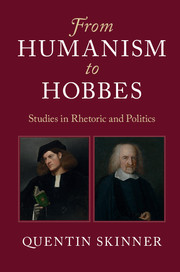Book contents
- Frontmatter
- Contents
- List of Illustrations
- Acknowledgements
- Conventions
- 1 Introduction
- 2 Classical Rhetoric and the Personation of the State
- 3 Machiavelli on Misunderstanding Princely Virtù
- 4 Judicial Rhetoric in The Merchant of Venice
- 5 Rhetorical Redescription and its Uses in Shakespeare
- 6 The Generation of John Milton at Cambridge
- 7 Rethinking Liberty in the English Revolution
- 8 Hobbes on Civil Conversation
- 9 Hobbes on Political Representation
- 10 Hobbes and the Humanist Frontispiece
- 11 Hobbes on Hereditary Right
- 12 Hobbes and the Concept of the State
- Bibliography
- Index
2 - Classical Rhetoric and the Personation of the State
Published online by Cambridge University Press: 16 January 2018
- Frontmatter
- Contents
- List of Illustrations
- Acknowledgements
- Conventions
- 1 Introduction
- 2 Classical Rhetoric and the Personation of the State
- 3 Machiavelli on Misunderstanding Princely Virtù
- 4 Judicial Rhetoric in The Merchant of Venice
- 5 Rhetorical Redescription and its Uses in Shakespeare
- 6 The Generation of John Milton at Cambridge
- 7 Rethinking Liberty in the English Revolution
- 8 Hobbes on Civil Conversation
- 9 Hobbes on Political Representation
- 10 Hobbes and the Humanist Frontispiece
- 11 Hobbes on Hereditary Right
- 12 Hobbes and the Concept of the State
- Bibliography
- Index
Summary
Among the humanist allegiances that Hobbes continues to display in the later stages of his intellectual career, one of the most striking appears in his analysis in chapters 16 and 17 of Leviathan of the concept of the persona civitatis, the person of the state. Although Hobbes's vocabulary in these passages reflects his close acquaintance with the theory of represented persons as elaborated by the Commentators on Roman Law, the authority on whom he principally relies is Cicero, the writer most deeply venerated by the humanist pedagogues of the English Renaissance. As early as 1531 Sir Thomas Elyot in his Boke named the Governour had singled out ‘the warke of Cicero, called in latin De officiis’ for its incomparable combination of ‘gravitie with dilectation: excellent wysedome with divine eloquence’, and had recommended it as a text that everyone must be sure to read. Hobbes appears to have taken this advice to heart, for it is to the De officiis that he owes almost the entire analysis of personhood that underpins his theory about the sovereignty of the civitas or state.
The most influential claim that Cicero makes about the persona civitatis can be found in his discussion of personae in Book I of De officiis. There he begins by presenting two general arguments about personhood. One is that, ‘while there are great differences between us in our bodily powers’, part of what it means to be a person is to be embodied. His other and connected claim is that everyone possesses a rational nature, and that ‘from this source the rational method of finding out our duty is ascertained’. From these contentions it proved a short step to the articulation of the view later given classic expression by Boethius in De personis. To speak of a person, Boethius maintains, is to refer to ‘an individual substance of rational nature’. Aquinas in his Summa theologiae raises some possible objections to Boethius's definition, but eventually he ratifies it in full, a move that had the effect of turning it into a long-standing orthodoxy. As we shall see in chapter 12, Boethius's definition was to survive unchanged to form the basis of Pufendorf's attack on the analysis of personhood put forward by Hobbes in Leviathan.
- Type
- Chapter
- Information
- From Humanism to HobbesStudies in Rhetoric and Politics, pp. 12 - 44Publisher: Cambridge University PressPrint publication year: 2018



